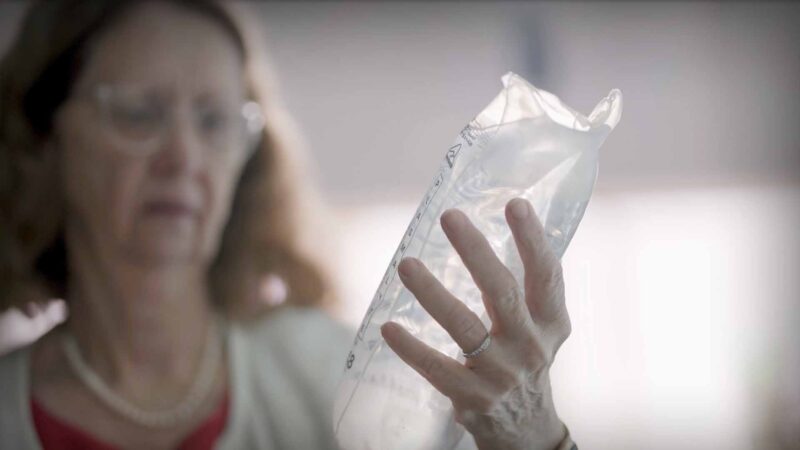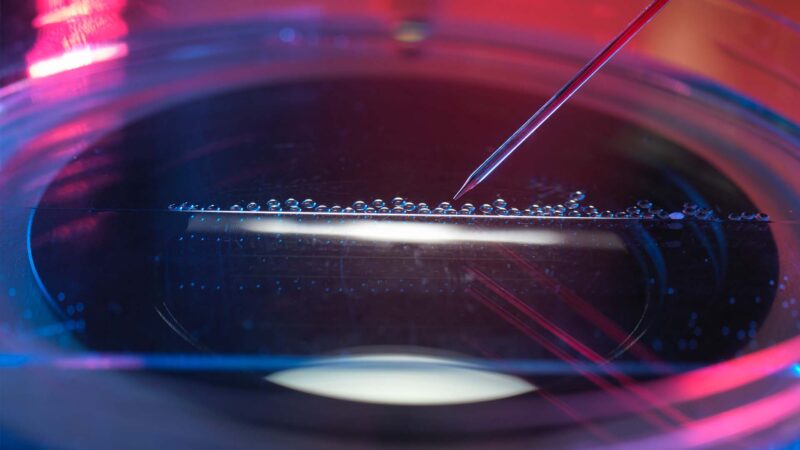RESEARCHER PROFILE Associate Professor Joy Wolfram
Group Leader, Australian Institute for Bioengineering and Nanotechnology,
School of Chemical Engineering,
University of Queensland
Brisbane, Australia
Filmed in Brisbane, Queensland | June 2024
Triple-negative breast cancer is aggressive, harder to treat and – for the 2500 Australian women who are diagnosed each year – the disease is more likely to spread to other organs and result in death.
Associate Professor Joy Wolfram, leading a nanomedicine and extracellular vesicle research program with the goal of developing innovative approaches that bring the next generation of treatments and diagnostics directly to the clinic, says this is partially because triple negative breast cancer cells are able to hijack a messaging network in our bodies and convince the immune system to ignore the problem.
Extracellular vesicles are the body’s text messages: little fat bubbles that carry vital information and cargo between cells. However, we know little about how these messengers move about. Understanding this process could be key to developing new diagnostic and therapeutic approaches for diseases such as cancer.
Assoc Prof Wolfram has joint appointments in the School of Chemical Engineering and the Australian Institute for Bioengineering and Nanotechnology at The University of Queensland, and through her work at the AIBN, she aims to develop a new paradigm of therapeutics (using nanotechnology and cell products) to treat life-threatening diseases that are major causes of death globally, including cardiovascular disease, kidney disease, and breast cancer.
It is hoped this will save lives by manufacturing at scale. In so doing, deliver national manufacturing innovation and a skilled workforce by working with a multidisciplinary team and industry partners to position Australia as a global leader in extracellular vesicle medicine.
Her particular focus areas are understanding the role of extracellular vesicles in cancer immunoevasion and metastasis, developing improved methods for extracellular vesicle isolation from human biofluids, and designing hybrid drug delivery systems with extracellular vesicle and synthetic components for a ‘best-of-both-worlds’ approach to treat cardiovascular disease and chronic kidney disease.
Her work has so far appeared in more than 80 journal publications and has received more than 30 awards from eight countries, including the 2016 Amgen Scholars Ten to Watch List (best and brightest up-and-comers in science and medicine across 42 countries), the 2019 Forbes 30 under 30 list in Health Care in the United States/Canada, the 2019 shortlist for the Nature Research Award for Inspiring Science (one of ten worldwide), and the 2021 Finnish Expat of the Year.
Assoc Prof Wolfram is currently funded by Australia’s National Breast Cancer Foundation, Health Translation Queensland, Mayo Clinic and Australian Government’s NHMRC.
You Might also like
-
World-first clinical trial improves patient outcomes for kidney transplants (2023)
A world-first clinical trial conducted at the Royal Adelaide Hospital (RAH) and at hospitals across Australia and New Zealand has identified the best fluid treatment to reduce the risk of patients requiring dialysis after a kidney transplant.
Around one in three people who receive a kidney transplant suffer delayed graft function, which means the transplant doesn’t work immediately and they require dialysis.
The lead-author of the study, was Royal Adelaide Hospital Nephrologist and University of Adelaide researcher, Dr Michael Collins.
-
Dr Zarina Greenberg
RESEARCH IN BRAIN COMPUTER INTERFACE
@ SYNCHRON
MELBOURNE, VICTORIA, AUSTRALIA -
Identification, characterisation and role of leader cells in ovarian cancer progression
Dr. Maree Bilandzic is a molecular cancer biologist dedicated to advancing the understanding and treatment of ovarian cancer (OC). Her research addresses critical gaps in OC treatment by investigating the mechanisms behind metastasis, chemotherapy resistance, and tumour recurrence. By utilising innovative methodologies and disease-representative models, Dr. Bilandzic has pioneered the identification and characterisation of leader cells (LCs)—a unique, stem-like subpopulation within tumours that plays a crucial role in OC progression.



